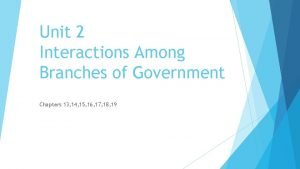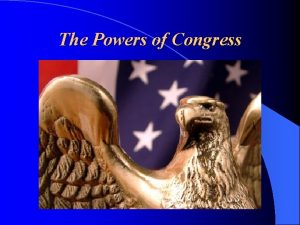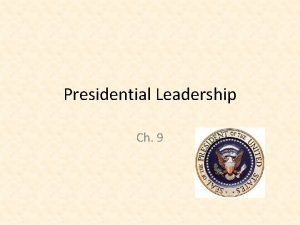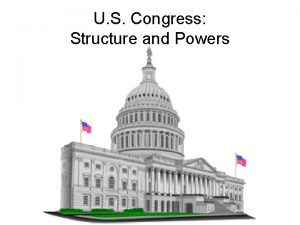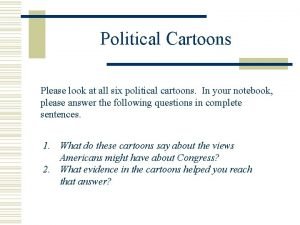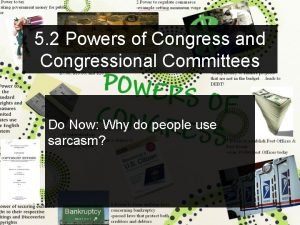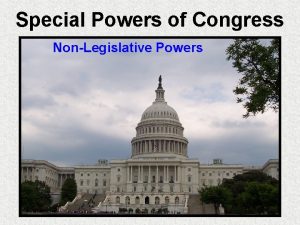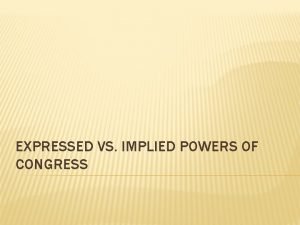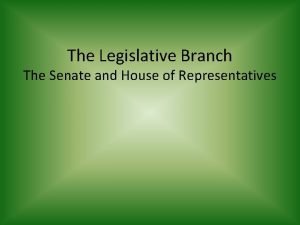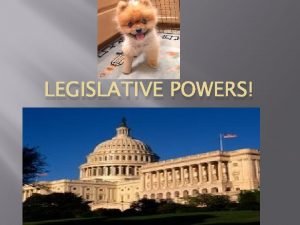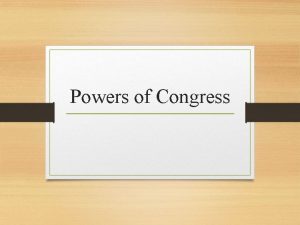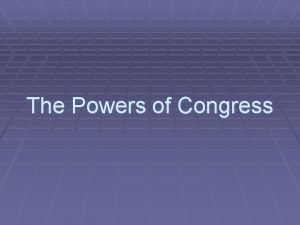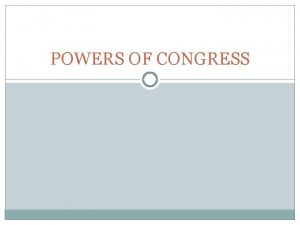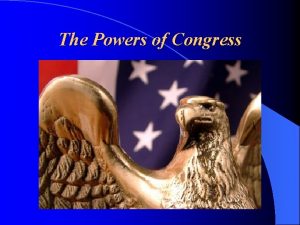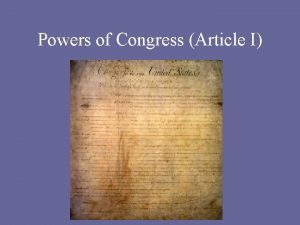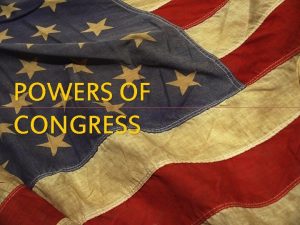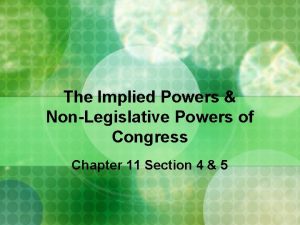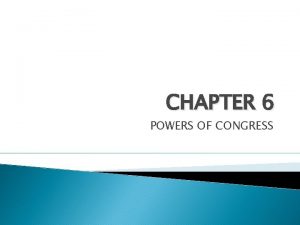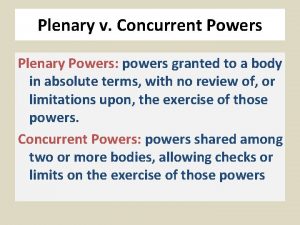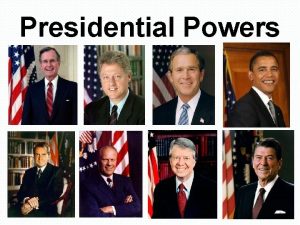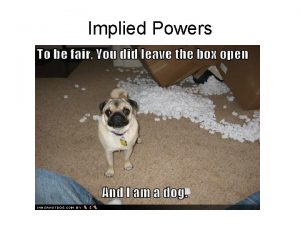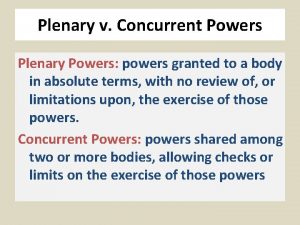GOVERNMENT CHAPTER 11 POWERS OF CONGRESS Daily Enduring





















- Slides: 21

GOVERNMENT CHAPTER 11 POWERS OF CONGRESS

Daily Enduring Understanding From the instant your alarm clock rings to the moment you go to sleep at night, the work of Congress has a significant impact on your daily life… An Ordinary Day…

The Work of Congress

The Powers of Congress Expressed Powers specifically listed in the Constitution Also called the enumerated powers Implied Powers not specifically listed in Constitution but which the government can reasonably claim as part of its governing responsibility Necessary and Proper Clause—Congress can “make all laws which shall be necessary and proper” for carrying out its duties Inherent Powers the Constitution is presumed to have delegated to the National Government because it is the government of a sovereign state within the world community

The Powers of Congress Expressed Powers Article I states Congress shall have “all legislative powers” Specific powers given to Congress include the authority to Levy and collect taxes Borrow money Regulate interstate and foreign commerce Coin money Declare war

The Powers of Congress Implied Powers (Necessary and Proper Clause ) Constitutional clause that gives Congress the power to make all laws “necessary and proper” for executing its powers Mc. Culloch vs. Maryland, 1819

The Powers of Congress The Expressed Powers To lay and collect taxes To borrow money Implies the power • To create tax laws and punish tax evaders • To use tax revenues to fund welfare, public schools, health and housing programs • To require States to meet certain conditions to qualify for federal funding • To establish the Federal Reserve System of banks To establish naturalization of law • To regulate and limit immigration To raise armies and navies • To draft Americans in the military To regulate commerce • To establish a minimum wage • To ban discrimination • To regulate banking

Power to TAX A charge levied by government on persons or property to raise money to meet public needs $2. 5 trillion in revenue for 2007 Congress does not have an unlimited power to tax Types of taxes? ? ?

Power to Borrow No constitutional limits on the amount of money that Congress may borrow, and no restriction on the purposes for which it can borrow Deficit Spending – spending more than what it takes in each year, and borrowing to make up the difference Public Debt – the money the government owes Balanced Budget Act of 1997 (Clinton)

Commerce Power The power of Congress to regulate interstate and foreign trade Sets how much should be charged for imports Not in Articles of Confederation 1780 s – States fought over trade barriers and laws Civil Rights Act of 1964: prohibits discrimination “in access to” or “service in” hotels, motels, theaters, and other public accommodations on grounds of race, color, etc… Power is as vital as the power to tax Many government decisions have been backed up on the power of the Federal government to regulate commerce between the states

Currency Power Congress has the power “to coin Money and regulate the Value thereof. ” States are denied power Congress created a national paper currency, “legal tender” in 1863. Articles of Confederation Unstable, worthless, no taxing power, 13 different currencies

$1 silver certificates, 1896 Martha Washington $5 Louisiana state bank note, 1862 Continental Currency

Evolution of Money… Who authorizes changes to currency?

Bankruptcy Power A bankrupt individual or company is found to be unable to pay debts in full by a court Today, bankruptcy cases are only heard in the Federal District Courts

Foreign Relations Powers Shares power with Commander in Chief Congress can: Declare War Raise and support military Provide and maintain a navy War Powers Resolution of 1973 Restrict the use of American forces in combat areas where a state of war does not exist.

The Non-Legislative Powers of Congressional Checks – have nothing to do with law making. Oversight—oversees executive agencies to make sure they carry out laws it has passed Confirmation—Senate confirms key officials appointed by President Impeachment—House impeaches federal official; Senate conducts (presides) over trial and votes to remove Ratification—Senate must approve all treaties negotiated by president Override—Congress can reverse president’s veto Amendment—Congress can propose an amendment to Constitution

Constitutional Amendments Federalism at its best: both national government working with state governments: 2/3 of both houses of Congress needed to formally propose a Constitutional Amendment ¾ of the state legislatures needed to ratify a Constitutional Amendment

Electoral Duties A presidential candidate needs the majority of electoral votes to win (270 out of 538) If no candidate wins a majority: The House of Representatives chooses the president The Senate chooses the vice president

Impeachment If a high ranking government official commits a crime or treason… The House of Representatives can impeach (formally accuse of a crime) him/her. The Senate holds the trial. The Senators are like the jury, the Supreme Court Chief Justice is the judge (he presides over the trial). If the person on trial is found guilty, THEN they can be removed from office.

Appointments The president has the power to appoint cabinet members, Supreme Court Justices, and ambassadors The Senate has the power to confirm (approve) those appointments. The president has the power to create treaties The Senate has the power to confirm them.

Internet Resources HTTP: //WWW. CENTERONCONGRESS. ORG/LEARN _ABOUT/LAUNCHER. HTM HTTP: //WWW. CENTERONCONGRESS. ORG/MODU LES/LEGISLATIVE_PROCESS/MAIN. HTM
 Chapter 11 powers of congress
Chapter 11 powers of congress Congress formal and informal powers
Congress formal and informal powers 4 powers of congress
4 powers of congress Chapter 9 presidential leadership
Chapter 9 presidential leadership Non legislative powers of congress
Non legislative powers of congress Expressed implied and inherent powers
Expressed implied and inherent powers Congress informal powers
Congress informal powers Non legislative powers of congress
Non legislative powers of congress Implied powe
Implied powe Congress formal and informal powers
Congress formal and informal powers Congress informal powers
Congress informal powers Implied powers of congress
Implied powers of congress 4 powers of congress
4 powers of congress Powers of congress
Powers of congress Necessary and proper clause cartoon
Necessary and proper clause cartoon Implied powers political cartoon
Implied powers political cartoon What are the non legislative powers of congress
What are the non legislative powers of congress Describes structure and powers of congress
Describes structure and powers of congress Expressed vs. implied powers
Expressed vs. implied powers Expressed vs enumerated powers
Expressed vs enumerated powers What are the powers of congress
What are the powers of congress Legislative and nonlegislative powers of congress
Legislative and nonlegislative powers of congress

